Top Rankings
Earlham Comm School District ranks among the top 20% of public school district in Iowa for:
Category
Attribute
Science Proficiency
Highest science proficiency (Top 20%)
For the 2025 school year, there are 3 public schools serving 660 students in Earlham Comm School District. This district's average testing ranking is 5/10, which is in the bottom 50% of public schools in Iowa.
Public Schools in Earlham Comm School District have an average math proficiency score of 72% (versus the Iowa public school average of 64%), and reading proficiency score of 69% (versus the 70% statewide average).
Minority enrollment is 7% of the student body (majority Hispanic), which is less than the Iowa public school average of 29% (majority Hispanic).
Overview
This School District
This State (IA)
# Schools
3 Schools
1,320 Schools
# Students
660 Students
501,674 Students
# Teachers
48 Teachers
34,800 Teachers
Student : Teacher Ratio
14:1
14:1
District Rank
Earlham Comm School District, which is ranked within the bottom 50% of all 325 school districts in Iowa (based off of combined math and reading proficiency testing data) for the 2021-2022 school year.
The school district's graduation rate of 90% has stayed relatively flat over five school years.
Overall District Rank
#161 out of 327 school districts
(Top 50%)
(Top 50%)
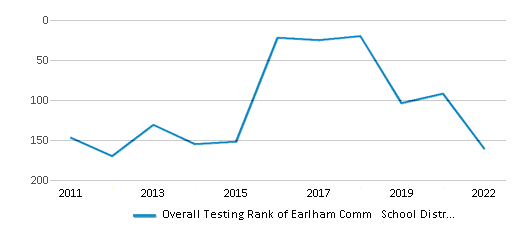
Math Test Scores (% Proficient)
72%
64%
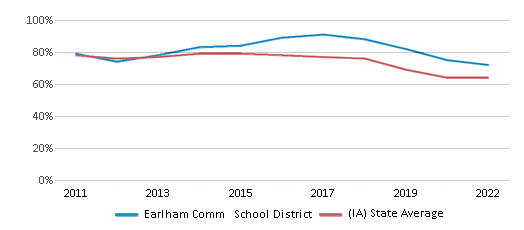
Reading/Language Arts Test Scores (% Proficient)
69%
70%
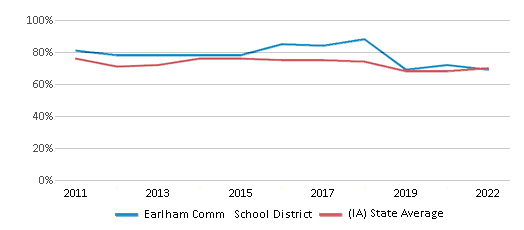
Science Test Scores (% Proficient)
70-74%
63%
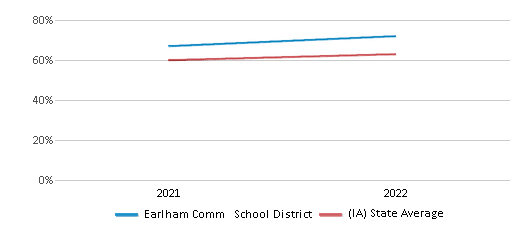
Graduation Rate
≥90%
90%
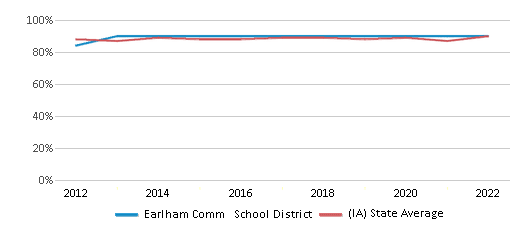
Students by Ethnicity:
Diversity Score
0.13
0.47
# American Indian Students
1 Student
1,876 Students
% American Indian Students
n/a
n/a
# Asian Students
2 Students
12,487 Students
% Asian Students
n/a
3%
# Hispanic Students
20 Students
65,144 Students
% Hispanic Students
3%
13%
# Black Students
6 Students
35,173 Students
% Black Students
1%
7%
# White Students
617 Students
358,105 Students
% White Students
94%
71%
# Hawaiian Students
n/a
3,371 Students
% Hawaiian Students
n/a
1%
# Two or more races Students
14 Students
25,133 Students
% of Two or more races Students
2%
5%
Students by Grade:
# Students in PK Grade:
39
23,213
# Students in K Grade:
43
36,488
# Students in 1st Grade:
46
34,545
# Students in 2nd Grade:
46
35,477
# Students in 3rd Grade:
53
35,334
# Students in 4th Grade:
45
35,902
# Students in 5th Grade:
44
35,813
# Students in 6th Grade:
54
35,551
# Students in 7th Grade:
43
36,022
# Students in 8th Grade:
39
37,018
# Students in 9th Grade:
54
39,092
# Students in 10th Grade:
58
39,818
# Students in 11th Grade:
48
38,859
# Students in 12th Grade:
48
38,542
# Ungraded Students:
-
-
District Revenue and Spending
The revenue/student of $14,033 in this school district is less than the state median of $16,468. The school district revenue/student has stayed relatively flat over four school years.
The school district's spending/student of $11,529 is less than the state median of $16,042. The school district spending/student has stayed relatively flat over four school years.
Total Revenue
$9 MM
$8,262 MM
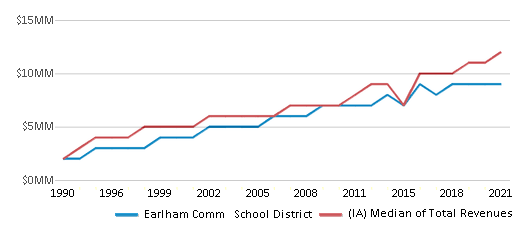
Spending
$8 MM
$8,048 MM
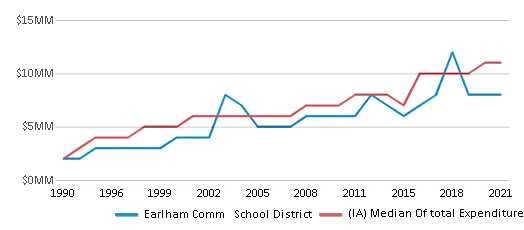
Revenue / Student
$14,033
$16,468
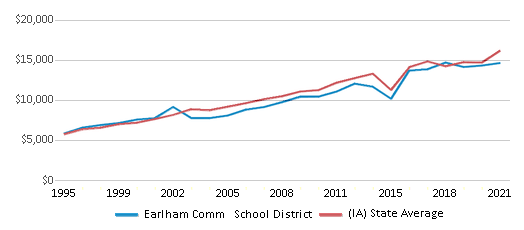
Spending / Student
$11,529
$16,042
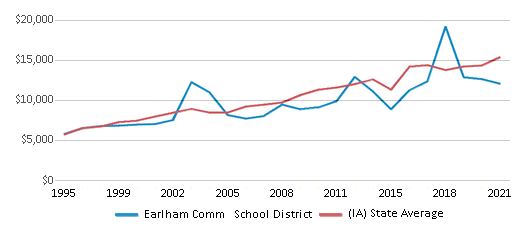
Best Earlham Comm School District Public Schools (2025)
School
(Math and Reading Proficiency)
(Math and Reading Proficiency)
Location
Grades
Students
Rank: #11.
Earlham Elementary School
(Math: 80-84% | Reading: 65-69%)
Rank:
Rank:
7/
Top 50%10
535 N Chestnut Ave
Earlham, IA 50072
(515) 758-2213
Earlham, IA 50072
(515) 758-2213
Grades: PK-5
| 316 students
Rank: #22.
Earlham Senior High School
(Math: 65-69% | Reading: 70-74%)
Rank:
Rank:
6/
Top 50%10
535 N Chestnut Ave
Earlham, IA 50072
(515) 758-2235
Earlham, IA 50072
(515) 758-2235
Grades: 9-12
| 208 students
Rank: #33.
Earlham Middle School
(Math: 65-69% | Reading: 65-69%)
Rank:
Rank:
5/
Bottom 50%10
535 N Chestnut Ave
Earlham, IA 50072
(515) 758-2214
Earlham, IA 50072
(515) 758-2214
Grades: 6-8
| 136 students
Frequently Asked Questions
How many schools belong to Earlham Comm School District?
Earlham Comm School District manages 3 public schools serving 660 students.
What is the rank of Earlham Comm School District?
Earlham Comm School District is ranked #166 out of 325 school districts in Iowa (bottom 50%) based off of combined math and reading proficiency testing data for the 2021-2022 school year. This district ranks in the top 20% of Iowa school districts for: Highest science proficiency (Top 20%)
What is the racial composition of students in Earlham Comm School District?
94% of Earlham Comm School District students are White, 3% of students are Hispanic, 2% of students are Two or more races, and 1% of students are Black.
What is the student/teacher ratio of Earlham Comm School District?
Earlham Comm School District has a student/teacher ratio of 14:1, which is equal to the Iowa state average of 14:1.
What is Earlham Comm School District's spending/student ratio?
The school district's spending/student of $11,529 is less than the state median of $16,042. The school district spending/student has stayed relatively flat over four school years.
Recent Articles

Year-Round Or Traditional Schedule?
Which is more appropriate for your child? A year-round attendance schedule or traditional schedule? We look at the pros and cons.

Why You Should Encourage Your Child to Join a Sports Team
Participating in team sports has a great many benefits for children, there is no doubt. In this article you will learn what those benefits are.

White Students are Now the Minority in U.S. Public Schools
Increasing birth rates among immigrant families from Asia and Central and South America, combined with lower birth rates among white families, means that for the first time in history, public school students in the United States are majority-minority. This shift in demographics poses difficulties for schools as they work to accommodate children of varying language abilities and socio-economic backgrounds.





